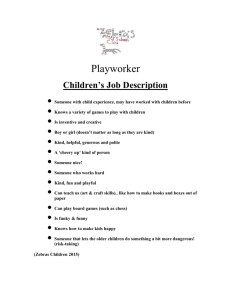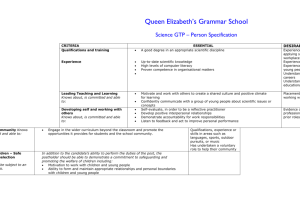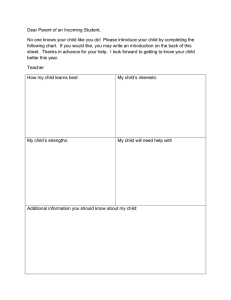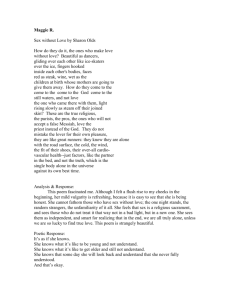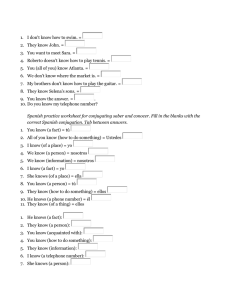Christine Liu scenario spectacular :: within the ideal, intelligent world
advertisement
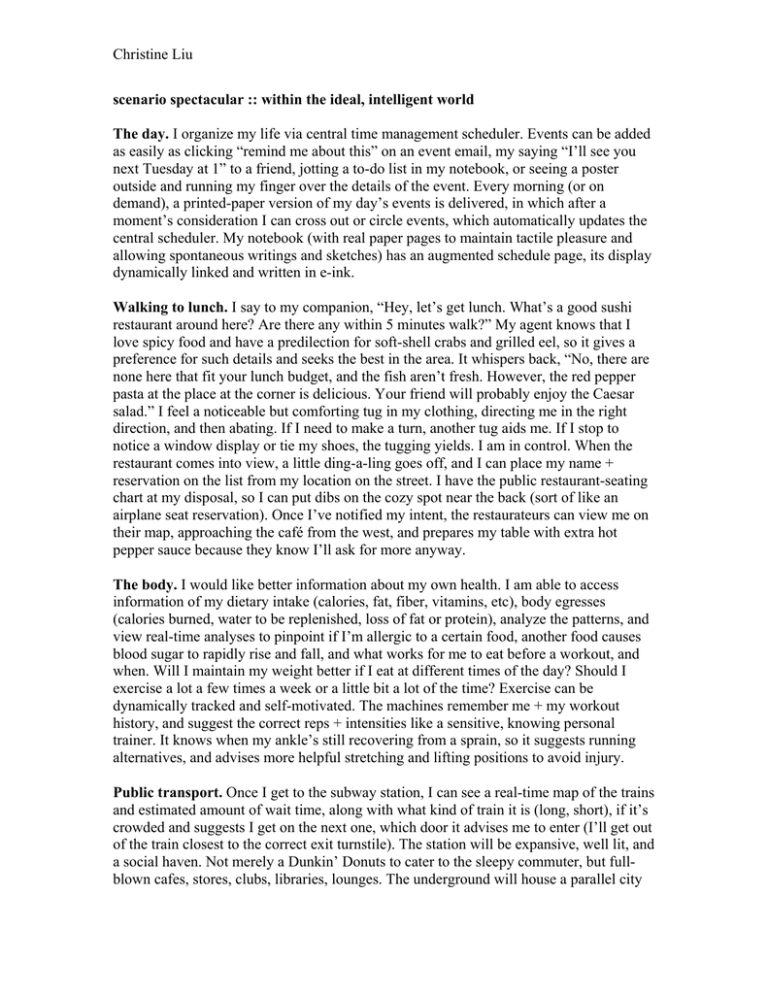
Christine Liu scenario spectacular :: within the ideal, intelligent world The day. I organize my life via central time management scheduler. Events can be added as easily as clicking “remind me about this” on an event email, my saying “I’ll see you next Tuesday at 1” to a friend, jotting a to-do list in my notebook, or seeing a poster outside and running my finger over the details of the event. Every morning (or on demand), a printed-paper version of my day’s events is delivered, in which after a moment’s consideration I can cross out or circle events, which automatically updates the central scheduler. My notebook (with real paper pages to maintain tactile pleasure and allowing spontaneous writings and sketches) has an augmented schedule page, its display dynamically linked and written in e-ink. Walking to lunch. I say to my companion, “Hey, let’s get lunch. What’s a good sushi restaurant around here? Are there any within 5 minutes walk?” My agent knows that I love spicy food and have a predilection for soft-shell crabs and grilled eel, so it gives a preference for such details and seeks the best in the area. It whispers back, “No, there are none here that fit your lunch budget, and the fish aren’t fresh. However, the red pepper pasta at the place at the corner is delicious. Your friend will probably enjoy the Caesar salad.” I feel a noticeable but comforting tug in my clothing, directing me in the right direction, and then abating. If I need to make a turn, another tug aids me. If I stop to notice a window display or tie my shoes, the tugging yields. I am in control. When the restaurant comes into view, a little ding-a-ling goes off, and I can place my name + reservation on the list from my location on the street. I have the public restaurant-seating chart at my disposal, so I can put dibs on the cozy spot near the back (sort of like an airplane seat reservation). Once I’ve notified my intent, the restaurateurs can view me on their map, approaching the café from the west, and prepares my table with extra hot pepper sauce because they know I’ll ask for more anyway. The body. I would like better information about my own health. I am able to access information of my dietary intake (calories, fat, fiber, vitamins, etc), body egresses (calories burned, water to be replenished, loss of fat or protein), analyze the patterns, and view real-time analyses to pinpoint if I’m allergic to a certain food, another food causes blood sugar to rapidly rise and fall, and what works for me to eat before a workout, and when. Will I maintain my weight better if I eat at different times of the day? Should I exercise a lot a few times a week or a little bit a lot of the time? Exercise can be dynamically tracked and self-motivated. The machines remember me + my workout history, and suggest the correct reps + intensities like a sensitive, knowing personal trainer. It knows when my ankle’s still recovering from a sprain, so it suggests running alternatives, and advises more helpful stretching and lifting positions to avoid injury. Public transport. Once I get to the subway station, I can see a real-time map of the trains and estimated amount of wait time, along with what kind of train it is (long, short), if it’s crowded and suggests I get on the next one, which door it advises me to enter (I’ll get out of the train closest to the correct exit turnstile). The station will be expansive, well lit, and a social haven. Not merely a Dunkin’ Donuts to cater to the sleepy commuter, but fullblown cafes, stores, clubs, libraries, lounges. The underground will house a parallel city Christine Liu to the one above, and the liveliness thrives via the circulatory, outreaching power of the subway. Instead of driving to their destination, passengers ride and immerse more deeply into the public + social space. Driving. Three things I hate most (in descending order): waiting endlessly in traffic, getting lost and disoriented, and being terrorized by offensive drivers. Fortunately, I don’t need to worry about these problems any longer. Cars are automated, so I just climb in, indicate my destination (“to grandma’s house we go!”), and begin the journey. The car knows everything about the roadway in real-time… from the traffic patterns to the construction tie-ups, from lane widenings/narrowings to blocked-off ways, from the cat darting into the street to when it’s time to refuel. The whole traffic system is networked, so my car knows exactly how to park, control its speed, how to avoid pedestrians, and maneuver among the other cars. The system is optimized for speed, so I am assured that I am getting there as quickly (and safely) as possible. I’m free to sit or relax or converse as I please, as if I were a passenger. Connecting. I want to meet with, talk to, play with, and work with other people. Technology has the power to simultaneously connect (electronic communication), and separate (as an intermediary). Within a social setting (at a party, in a meeting, in a café) I want a personal connection as intimate + analog as slipping a love letter in a pocket, returning someone’s gaze, or complimenting someone on his or her bag. We can exchange signals of interest or personality through mutual interactions with objects in the environment. I put a special bookmark in a magazine and hand it to my friend; they see links to all my favorite articles and images. I clink glasses with the cute boy; he sees a cute message when he finishes his drink at the bottom of his coffee cup. I tap my foot to a certain beat in my head; the jukebox recognizes my tune and cues it up next. We play games on the tables and the walls; my finger traces out a message that disappears like invisible ink and reappears for the next lucky person who ‘decodes’ the message with their touch. Fashion. Nothing is peripheral; there’s a high level of personal integration. Clothes are an outfit of connected devices which give us more control; they become us. The most intimate and necessary garment, underwear, centralizes the system. It’s safe, close, personal, and worn everyday. Everything else wirelessly communicates within. Tiny speakers in my earrings whisper reminders or broadcasts my favorite song when I’m blue. My sweater traps more air when the temperature drops; thins out to a mesh when it’s warmer. My skirt has a built-in rocket booster for times when I need to turbo-rev my way. Everything I wear is customized; a system scans my body and knows the exact measurements and proportions to make the best-fitting and most comfortable clothes. In all things, we shouldn’t change for technology; we should remain true to ourselves.

